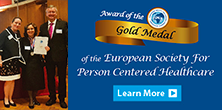6th Annual Conference, European Society for Person Centered Health Care (London, UK, February 2020)
Amidst the Coronavirus storm we have managed to piece together a summary of the recent 6th Annual Conference of the European Society for Person Centered Healthcare in London, UK, from 27th to 28th February of this year.
—-
What a conference! Speakers and delegates from around the world, and well engaged panel discussions that overflowed into the breaks and far beyond..
Person centeredness has many perspectives and many disciplines. Whether you are an academic, a physician, a person as a patient, a patient organisation, an administrator, a social worker or home care provider, we all have input into how person centeredness is being shaped.
The central theme of the conference was one of collaboration, or as it was referred to by Dr Amy Price and others in their talks, co-production. Creating a system that can deliver person centered care requires us all to work together, to make sure that all our perspectives are shared and incorporated in the system itself. Everyone is a person, each with valuable perspective and knowledge, each with human rights and sensitivities.
The 2020 conference addressed many of the inputs, conflicts, trends and components of person centered care.
Myriam Dell’Olio (and co-workers) noted that “that while there is surging interest in person centered care, feedback from persons as patients finds that “healthcare professionals are not delivering or implementing… in a meaningful way”.
Dr Michelle Croston, a senior lecturer and advanced nurse practitioner, discussed what it meant to be person centered in the care of people living with HIV. She referenced a Wellness Thermometer that had been developed to assess the wider social and emotional and spiritual wellbeing of persons in addition to clinical and biological concerns – the inserted link refers to a previous presentation on the Wellness Thermometer.
Dr Jeremy Howick talked about the use of positive expectations, empathy and placebos in addressing some of the many ailments that clinical method seems unable to address and a link to one of his and other co-workers papers is provided. Lower back pain is one such area of attention. A UK BBC2 documentary programme did a study on placebos with the help of Dr Howick and found some interesting results.
We then considered the impact of robots, nursing culture, spirituality and artificial intelligence with presentations by Professor Marilyn Ray, Colonel (Ret.) and Colonel Dr Marcia Potter of the US Air Force. The US Air Force through the work of Dr Ray (her Theory of Bureaucratic Caring) and others has helped develop person centered care processes within the US forces medical system, addressing the interaction of formal structures and the needs of the person.
The conference was well represented by “patient” groups: The Patient’s Association (UK), Melanoma UK, Cannabis Patient Advocacy with its mental health focus, Genetic Alliance UK (Rare Diseases) and the Brittle Bone Society, and last but not least Parkinson’s Concierge, a dynamic duo, both living with Parkinson’s and both engaging widely in addressing the many aspects of the disease. The patients organisations discussed many of the barriers they face in helping the needs of persons as patients be recognised, but they also discussed the many ways they are working with health systems and other organisations.
We had a talk from a director of patient engagement at a UK National Health Service Trust (Co-production) that illustrated how bringing in patient engagement within hospitals can significantly reduce complaints and enhance person as a patient satisfaction.
We had a talk from Grace Meadows, program director Music for Dementia 2020, on the importance of music for those living dementia from the perspective of “doing with” as opposed to “doing to”. This was followed by a presentation by Samantha Hughes, a doctoral student, on some important results from one of the longest running studies on social prescribing in the UK. Social aspects of social prescribing and the need to provide ongoing social opportunities beyond the often short periods of these interventions were highlighted results.
Day two started with our own “Jane Teasdale’s” keynote presentation on some of the many complexities of home care, then moved to a presentation on behavioural science and how this impacts decision making for clinicians and persons as patients. Next, Dr. Rajni Lal, a Specialist Registrar in Geriatrics, talked about the decision making process for older people undergoing surgery and how older adults’ priorities often conflict with prescribed surgeries.
We had presentations on quality of life decision making and some of the ethical dilemmas posed by the cost of medical treatments, by Dr Vije Rajput, and a talk from Denmark on some of the pitfalls in assessing infant social withdrawal. This was followed by a light-hearted presentation on Frohlich groups, which is a form of acting therapy for both clinicians and patients.
Dr Bruno Kissling, a Swiss doctor then presented on a person centered framework of interaction for both doctor and patient, addressing trusting relationships, active listening, patient reflection and the consultation as an interactive process, with both doctor and person as patient as experts at “eye level”.
The conference also addressed the importance of digital and data solutions, from pharmaceutical companies reinventing themselves to software developers (RemindMeCare/ReMeLIfe,Simon Hooper) engaging fully with the social and emotional space of the person living in the care home. We had an especially interesting talk from Dr Bharat Tewarie who presented on how artificial intelligence and big data could be used to inform decision makers of human needs, wishes and priorities in health care.
A special thanks to the European Society for Person Centered Healthcare, in particular Professor Andrew Miles and Sir Jonathan Ashbridge for organising and running this highly focused, incredibly detailed and informed set of presentations and discussions.
